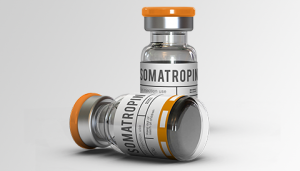
Recombinant growth hormone is identical in composition and effects to the pituitary hormone of human growth. It is a polypeptide comprising 191 amino acids. It stimulates the skeleton’s growth and transport of amino acids into the cell, accelerating the intracellular synthesis of the protein and thus showing an anabolic effect. It causes a delay in the body of nitrogen, mineral salts (calcium, phosphorus, sodium) and liquid. It also increases the level of glucose in the blood, body weight, muscle activity and physical endurance.
Fats metabolism
Somatropin activates low-density lipoprotein (LDL) receptors in the liver and changes the profile of lipids and lipoproteins in the blood. In general, the appointment of somatropin to patients with a deficiency of growth hormone leads to a decrease in blood levels of LDL and apolipoprotein B. There is also a decrease in cholesterol concentration.
Carbohydrate metabolism
Somatropin increases the release of insulin, but the fasting glucose concentration usually does not change. Children with hypopituitarism may develop fasting hypoglycemia. This condition is reversible upon administration of somatropin.
Water-mineral metabolism
Deficiency of growth hormone is associated with a decrease in the plasma volume and extracellular fluid. The administration of somatropin leads to a rapid increase in both parameters. Somatropin promotes retention of sodium, potassium and phosphorus.
Bone metabolism
Somatropin stimulates bone metabolism. Long-term treatment of children with growth hormone deficiency and osteoporosis results in normalization of mineral composition and bone density.
Physical activity
Long-term substitution therapy with somatropin leads to an increase in muscle strength and physical endurance. Cardiac output is also increased, although the mechanism of this action is not completely clear.
Indications of use
– Long-term treatment of children with growth retardation due to of insufficient endogenous growth hormone secretion;
– Long-term treatment of short stature with Turner syndrome;
– Treatment of children of prepubertal age with short stature caused by chronic renal insufficiency;
– Substitution treatment in adults with an inadequate endogenous growth hormone, which occurred in childhood or adulthood.
Despite the multiple positive properties of Somatropin, such treatment can cause serious side effects, among which the following factors can be noted:
- weakness;
- peripheral edema seen in the first days of drug administration;
- fast fatigability;
- increased intracranial pressure with nausea, severe headache;
- joint pain;
- pancreatitis;
- decreased visual acuity;
- allergic reactions.
Contraindications
– Hypersensitivity to the somatropin or to any other component of the drug;
– Neoplasm;
– Stimulation of growth for the patients with closed epiphyseal growth zones;
– Patients in critical condition in a result of open heart or abdominal surgery, with multiple trauma or acute respiratory failure.
Special instructions
Insufficiency of growth hormone must be confirmed as appropriate before treatment begins.
The maximum recommended daily dose of the drug should not be exceeded.
In adults with growth hormone deficiency, the diagnosis should be made according to the etiology:
Admission to adulthood: The patient should have a growth hormone deficiency due to of a hypothalamus or pituitary disease, and a diagnosed deficiency of at least one other pituitary hormone (with the exception of prolactin). A test for growth hormone deficiency should not be performed until adequate substitution therapy for a deficiency of other hormones.
Admission in childhood: Patients suffering from growth hormone deficiency in childhood should be re-examined to confirm the presence of a growth hormone deficiency before treatment with Somatropin.